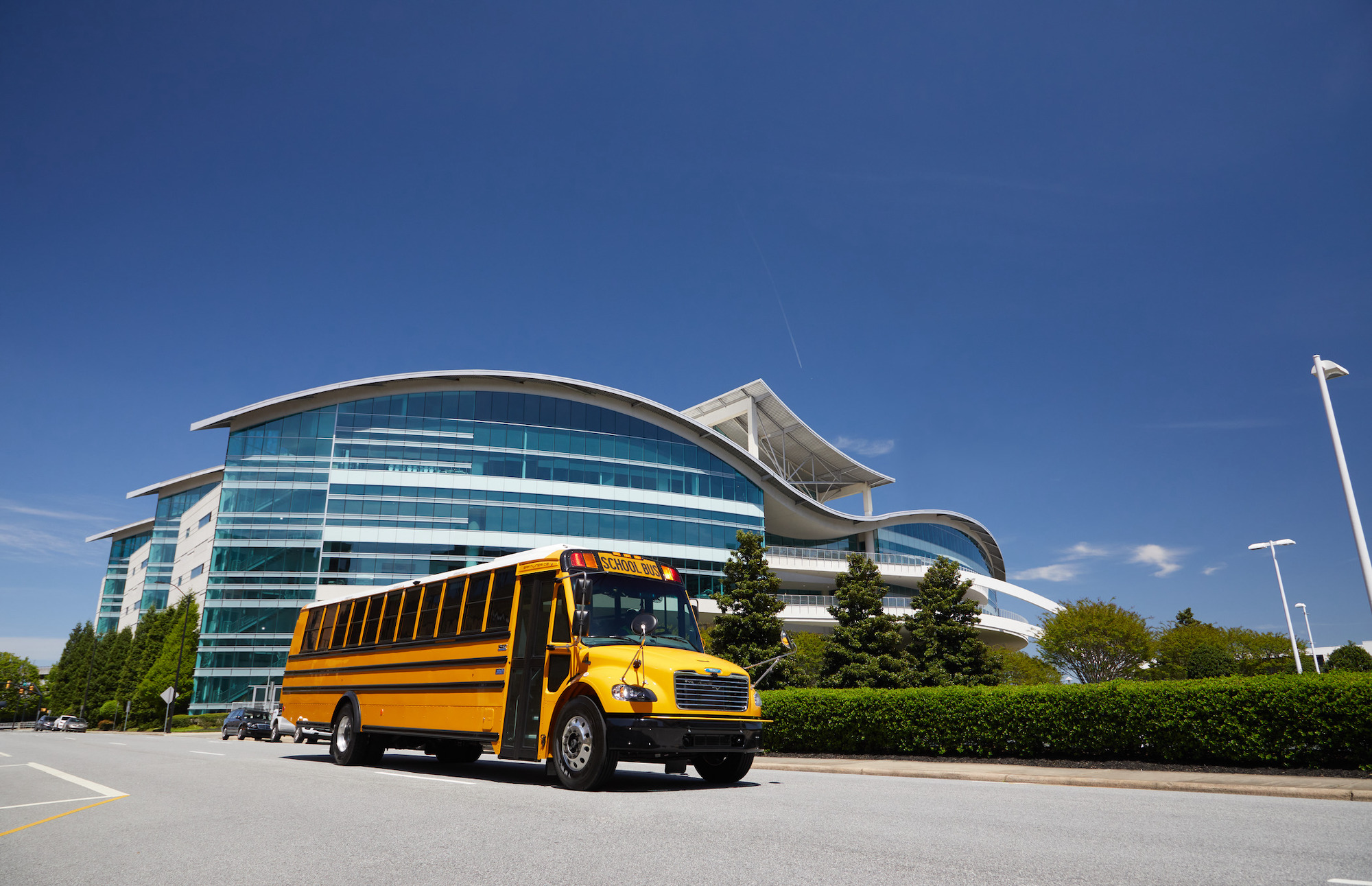Sign up for daily news updates from CleanTechnica on email. Or follow us on Google News!
Everybody is familiar with the children’s ditty The Wheels On The Bus Go Round And Round. It is both sophomoric and moronic. It’s one of those tunes that burrow deep into our brains and won’t let go. I may have to listen to Bohemian Rhapsody several times just to stop thinking about it. We at CleanTechnica have been covering the transition to electric school buses for several years, but there’s a new player in town — the propane industry — and it is spending heavily to convince school boards and administrators that propane-powered school buses are a way to lower carbon emissions from school buses at much lower cost.
It’s a lie, of course. Propane, sometimes called petroleum gas, is a byproduct of the oil refining process. As such, it may create different kinds of nasty stuff when it is burned than diesel does, but you still wouldn’t want to put a lip lock on the tailpipe of a propane-powered school bus and inhale deeply.
Today there are 500,000 school buses in America. About 6000 of them are battery-powered, which means it could be 20 years or more before the majority of them are zero emissions electric buses. Despite the fact that the federal government is putting up $5 billion in incentives for schools to buy electric, there is a big hurdle. An electric school bus can cost as much as $300,000. Multiply that by the remaining 494,000 school buses that need to be replaced and you come up with a staggering amount of money.
Propane & Near Zero Emissions
Propane users pay a half cent per gallon fee. It’s not a tax that goes to governments to do public good; it goes to the industry to promote itself. According to Vox, the Propane Education and Research Council has a $47 million budget, which it uses to support its public education campaigns. Here’s how it works.
Last year, the popular children’s magazine The Week Junior advertised a contest called “Be Like Jack” that would award $2,000 to the preteens or teens who submitted the winning ideas for an environmental project. A few dozen kids from around the country participated, submitting proposals meant to boost sustainability in their elementary or middle schools. A nine-year-old from Colorado won the grand prize for her tree planting project.
To celebrate her win, Emily Calandrelli, host of the Netflix science show Emily’s Wonder Lab, visited the winning school during a science assembly that touted the environmental benefits of propane-powered school buses. A spokesperson for PERC told Vox the purpose of the contest was to “educate school children about energy options.” The group maintains that propane power buses have lower NOx emissions than diesel-powered buses, a fact they say that makes then “near zero emissions” vehicles.
That’s true, if the conversation is limited to just NOx emissions. PERC likes to cite an industry funded study that draws a sharp contrast with diesel, showing that engines that run on propane emit 95% fewer nitrogen oxides than diesel. In fact, the same study showed propane could be worse than diesel when it comes to carbon dioxide and carbon monoxide emissions.
The industry frequently uses the phrase “near-zero emissions” to describe the propane bus. This is disingenuous, Vox says. The EPA recognizes that propane buses produce some lower emissions, like nitrogen oxides, than other fuels, but they do pollute nonetheless. Propane emits many of the same hazardous pollutants as diesel, and the industry fully ignores the toll of greenhouse gas emissions.
The Department of Energy’s National Lab modeled emissions of propane compared to post-2010 diesel buses and found they “do not offer significant air quality benefits.” A 2023 analysis from the World Resources Institute found no benefits of propane over diesel when it comes to climate pollution.
Even some manufacturers of propane buses have called out the misinformation. “Propane school buses are being lauded as the cleanest in the industry,” said Caley Edgerly, a former president and CEO of Thomas Built Buses, in a blog post in 2018. “We produce propane school buses, so of course we would stand behind that statement if it were true. Unfortunately, we can’t unequivocally say that propane is the cleanest fuel for school buses today.
“Based on EPA certifications, propane provides the lowest level of NOx in the industry. This is true. But when considering the other EPA regulated emissions, like particulate matter, carbon monoxide, and nonmethane hydrocarbon, propane is not the clear winner in all of the four critical emissions categories. All engine types have nearly the same emissions footprint, and this footprint has improved dramatically compared to just 10 years ago.”
PERC’s senior vice president of communications Erin Hatcher sent an email to Vox in which she maintained that propane “is designated a clean alternative fuel by the Environmental Protection Agency. Propane buses produce much fewer NOx emissions than diesel, as you pointed out, and virtually zero particulate emissions. They also run much more quietly. When it comes to student health, these are relevant facts that show propane’s advantages when compared with diesel.”
Propane & Kids
All this blather about which fossil fuel is “cleaner” is so much eyewash designed to keep propane in the game for quite a while. A school bus manufactured today is expected to have about a 10-year useful life. Afterwards, they often get sold to other countries, where they continue to spew out their climate killing greenhouse gas emissions for decades more.
It is understandable that any industry would have an interest in self preservation. That’s human nature — unfortunately. The propane industry sees an opportunity to expand its business into a major new market, and of course they are going to try to maximize that opportunity.
It’s part of the “all of the above” dogma that reactionaries espouse all the time. “Sure solar and wind are wonderful, but we will need coal and methane and nuclear generating stations far into the future to guarantee America’s energy security.” Translated, that means, “We know our products are degrading the environment but can we just keep them around for a while — at least until our kids are out of college?”
There is nothing inherently wrong with promoting yourself, but doing so by messing with the minds of impressionable school kids smacks of evil intent.
Electric School Buses For The Win

Jacqueline Hayes is the deputy director of transportation for the Boston School District. “If somebody handed me an endless amount of money, and said ‘electrify your entire fleet tomorrow,’ there will be some routes that would be challenging to electrify today,” she told Vox. “But we’re pretty confident that technology is going to get there in the next five years. I’m focusing on the parts of the problem I can solve today.”
Advocates say electrifying the school bus fleet is feasible in most of the country, where routes usually run shorter than 100 miles. Yes, they cost more to buy but they cost less to operate and maintain.
“The maintenance is probably about a third of the cost of a combustion engine vehicle,” said Duncan McIntyre, CEO of Highland Electric Fleets, a company that contracts services for electric school buses. “The engine and the batteries are the same used in electric transit, like city buses. Some of those city buses have gone 250,000 miles without needing much by way of repairs. So, we have some good data as an industry and evidence that these vehicles will last a long time.”
The Takeaway
Given the fairly shocking news that average global temperatures soared in September to never before seen heights, wouldn’t it make more sense to educate kids about the benefits of electric transportation rather than perpetuating myths about fossil fuels?
Carmen Cortez has been a school bus driver for more than twenty years. Two years ago, she started driving an electric school bus when Maryland’s Montgomery County public school district was selected to pilot the largest electric fleet in the country, with 86 buses.
“I resisted at first, because I didn’t know what this change meant for my job,” Cortez says but quickly changed her mind. “From that moment, I realized that we are at the front lines of a transition in the transportation sector, and that I could be a part of this process and help improve the health of the students in my district, my own health, that of my community, and of the planet.”
CleanTechnica readers will recognize this phenomenon. Everyone is afraid of change. Nobody wants to drive an electric car, but once they do, they never want to go back.
Electric school buses have one more potential advantage and it is huge. All those batteries sit idle for many hours a day and could be used as the backbone of virtual power plants. Are there any utilities out there who are thinking, “Wow. Instead of spending big buxs on storage batteries, we could be making use of those batteries to soak up renewable energy in the day time and sent it back to the grid in the afternoon and at night?”
Change happens and we can either spend our energy fighting it or embracing it. If the Earth is going to continue being a home for humans for millennia, we damn well better embrace change. Today would be a great time to start.
Have a tip for CleanTechnica? Want to advertise? Want to suggest a guest for our CleanTech Talk podcast? Contact us here.
EV Obsession Daily!
I don’t like paywalls. You don’t like paywalls. Who likes paywalls? Here at CleanTechnica, we implemented a limited paywall for a while, but it always felt wrong — and it was always tough to decide what we should put behind there. In theory, your most exclusive and best content goes behind a paywall. But then fewer people read it!! So, we’ve decided to completely nix paywalls here at CleanTechnica. But…
Thank you!
Tesla Sales in 2023, 2024, and 2030
CleanTechnica uses affiliate links. See our policy here.





